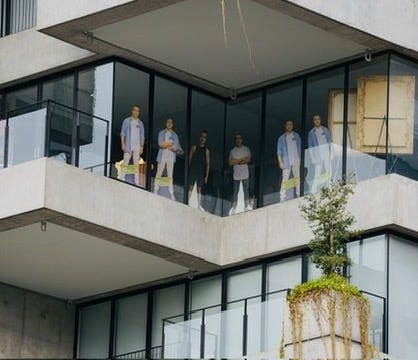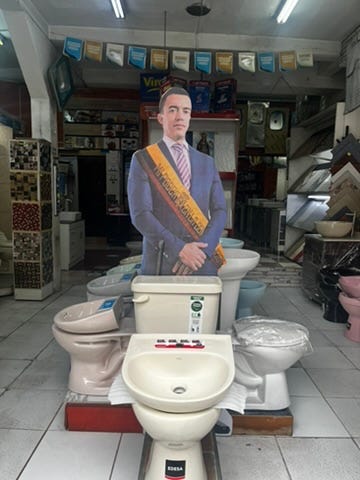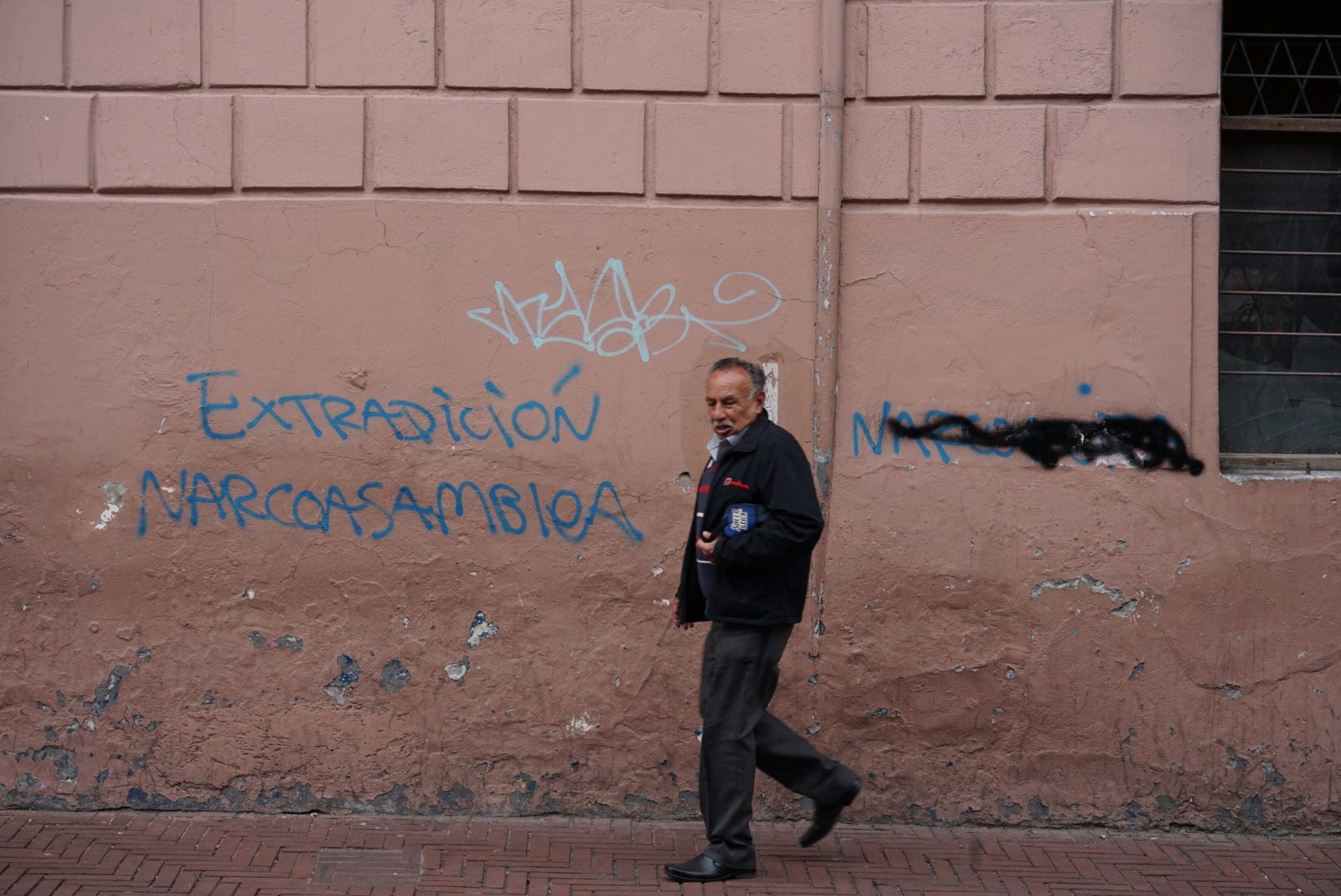‘Carnival of Despair’ as Ecuadorians head to Polls
Amidst security concerns, constitutional crises, and growing public doubts, the country holds first round of presidential elections

Anastasia and Douwe, two freelance journalists, combine investigative reporting with cycling from Colombia to Argentina. This story is published in cooperation with their project, OffMap Media, which brings you on-the-ground reporting from all corners of the Andes.
*This article will be updated throughout the day
The streets of Quito have a carnival feel, as crowds of Ecuadorians push past street barbecues and artisans to make their way to the polls to vote for their next president and assembly members.
Outside voting stations men and women bark offers to laminate voting cards for $0.25. Voting is obligatory and Ecuadorians will need to present the voting card as proof when opening a bank account, signing a lease, or trying to emigrate abroad.
Others stroll around with heavy loads hawking homemade snacks, juices, water, and soda – selling alcohol is prohibited. Enterprising families set up stalls selling snacks like bolón, a local treat of fried green plantain stuffed with cheese.
“You make money. But it’s more about spending time with family and sharing your food with others. It’s a tradition,” Christian Arbolera, a bolón vendor told PWS. “We always always set up a stall at election time.”
Voters doubt candidates’ abilities to handle growing crisis
But, after a harrowing year marked by security, economic, and constitutional crises, these festivities mask an undercurrent of anxiety and exhaustion among a populous who say they see little real leadership to choose from.
When asked if she was excited to vote Jaqueline Sánchez rolls her eyes and laughs. “We’d love a third option,” she says. “But it's the same thing again. And again. And Again.”
Election fatigue is a common theme among those exiting the polls, with some telling Pirate Wire Services they would not be there if the law didn’t mandate it.
“No, I’m not excited to vote. We’ve gone to the polls more than five times in four years,” an economist working in the energy sector, who asked to remain anonymous for fear it could hurt his ability to work with the government. “There are 16 candidates, but 90% of their proposals are the same and they have little credibility as such,” he added.
Ecuadorians last elected their president, Daniel Noboa, just over a year ago. That election dominated news cycles, especially after gang members killed one of the candidates, Fernando Villavicencio, on the campaign trail.
Noboa, then a 35-year-old rookie in the legislature who barely registered in presidential polling, reacted to the murder with hardline rhetoric promising to bring down the state’s “mano dura” (iron fist) if he won. That resonated with a terrified electorate, which got Noboa enough votes to pass into the second round. There, he capitalized on the momentum by positioning himself as an “outsider” running against establishment candidate, Luisa Gonzáles.
Gonzáles carries heavy political baggage in the form of her political mentor and the RC’s once-leader, Rafael Correa, president from 2007 to 2017.
Along the coast and outside of the cities Correa is still revered for pouring money into social spending and overseeing a drastic fall in poverty.
“A genius like Correa only comes around once every hundred years,” said Marco Billais, who voted Noboa in the previous elections, but now longs back to the days of Correa.
But for much of the rest of the country, Correa’s name is synonymous with authoritarianism and corruption. For many, the sitting president is less of a candidate in his own right than the only alternative to Correismo’s return — and perhaps the return of Correa himself as well.
“Noboa. We voted for Noboa,” Maricia Luna says before we can even ask a question. “We’re voting against socialism and we see no third option on the ticket — no one with potential.”
“I vote for Noboa because I don’t want to migrate,” her niece, Christina adds. “I love my country. I want to have kids and raise them here in Ecuador. But if the left comes back into power I’ll have to migrate.
Noboa had the most visible campaign, at least in Quito. The president – in aviators, dressed for the office, for a day at the gym, or in casual jeans and a t-shirt – looks out at voters from seemingly every storefront and apartment window. His cutouts in the city are ubiquitous.


But many of those who display them and spoke to PWS, the enthusiasm is lackluster. Many expressed desperation for consistency and told us they're supporting Noboa despite, rather than because of his record over the past year.
The “Iron Fist”: Few results, many human rights violations
One older couple, whose cafe was guarded by a Noboa cutout, said they hoped, given more time, its living counterpart could do more for the country. They named security as their main concern, and though Noboa boasts he has made the country safer, the couple had no glowing reviews.
“No! Nothing is ok here,” said the older man, who asked not to be named. “There should be police here at all hours. Instead, there are thieves. Nothing has gotten better.”
Noboa declared an internal state of conflict in January 2024, kicking off a year marked by militarization – of the streets, the prisons, and political rhetoric.
At first, these hardline policies seemed to yield results with falling homicide rates. But cases of extortion and kidnapping continued to rise unabated and the modest security gains eventually gave out as criminal groups adjusted to the new reality. January 2025 was Ecuador’s most violent month on record.
The national murder rate remains well above pre-pandemic levels.
“The situation is fatal. You walk around terrified that someone is going to assault you. I got robbed at gunpoint recently.” said Fernando Ron, a 79-year-old retiree and widower and Noboa supporter. He explained that since his wife died he likes being out of the house to keep busy, but worries he’ll be robbed again. “My daughter lives in Sweden and as soon as my papers are ready I’m going to emigrate too,” he says.
Voters, NGOs, and activists also worry about human rights abuses and constitutional overreach.
“We need transparency, we need the fraud to end, we need them to respect the voice of the people,” said Ricardo Almargo, who works in private security.
In December 2024, soldiers detained four Afro-Ecuadorian kids, the youngest of them 11. They were never seen alive again, but their charred bodies were found on December 24. The military denied any involvement but backtracked once security camera footage surfaced showing the arrest. Since then, they’ve admitted that the kids were picked up on suspicion of robbery but claimed they were later released alive.
There was no evidence linking the boys to a robbery and no record of them being released to the proper juvenile authorities. A judge has ruled that the kids were forcibly disappeared by the state and ordered an investigation, but the Ministry of Defense responded to her ruling with political threats.
The incident, known as the Malvinas Case, rocked Ecuador.

“The worst thing is that there are many more cases of children forcibly disappeared, their mothers are still looking for them,” Daisy Cornejo, a police officer, said while rocking a stroller with her infant son. “I am also a mother, and I would be devastated to not know where my child is.”
Experts confirm that the Malvinas Case is just the most visible in a slew of human rights violations, arbitrary detentions, prison torture, and forced disappearances since the internal state of conflict began a year ago.
“The problem is that society is so polarized that anyone who defends human rights is also [seen as] a criminal,” a researcher who works in Ecuador’s prisons and asked to remain anonymous for fear of losing her job, she said. “The point is… no one cares.”
Naboa bends then breaks election law
Noboa has capitalized on this polarization to expand his own power, first bending, then breaking what’s permissible under the constitution.
Judges have repeatedly ruled his internal conflict against the gangs unconstitutional as well as his repeated suspensions of vice-president Verónica Abad from office. In January, when Ecuador’s campaign season officially began, Noboa was obligated to transfer power to Abad. He refused to do so, violating both the constitution and campaign laws.
The National Electoral Council (CNE) has been slow to respond and other state institutions have refused to weigh in at all. And though some voters are weary of this creeping authoritarianism, others willingly embrace it.
“Yes, he broke constitutional norms. But our constitution is trash, written by a leftist madman,” Luna said referring to Correa.
Given the slew of crises facing Ecuador, few of those who spoke to PWS saw democracy as a top priority. Aside from security, economic growth seemed the most important issue to voters.
“Something’s gotta give. I’m voting to change this government” Marizela Carrion, who works in tourism, said. “We have nothing. Not education, not social benefits, not security. Nothing. Noboa has no idea what he’s doing.”
Since 2017, Ecuador has had the worst-performing economy in South America, according to a 2023 CEPR study, which found that poverty and inequality reached their highest levels in more than a decade even before the COVID pandemic pummeled the nation.
In 2024, unseasonable dry spells and a decade of infrastructural neglect collided, throwing the country into literal and metaphorical darkness with rolling blackouts that lasted up to 14 hours a day. Noboa’s administration was caught unprepared and has been slow to respond. Many small and medium-sized businesses shut down, further depressing an already reeling economy.
None of the candidates have presented concrete, financially viable plans to confront this – or any of Ecuador’s other looming challenges.
“I expected a candidate who could lead,” the vendor Sanchez said. “But none of them could explain their plan [for the country]. They just threw cheap shots at each other,” she concluded.
The Big Headlines in LATAM
During a visit to El Salvador, U.S. Secretary of State Marco Rubio talked with President Nayib Bukele about the possibility of the authoritarian state accepting both U.S. deportees and U.S. prisoners.
Shortly after the meeting, the Salvadorian leader stated that he had "offered the United States of America the opportunity to outsource part of its prison system,” stating that El Salvador would be "willing to take in only convicted criminals" and that his government would do so "in exchange for a fee".
He also offered to accept Venezuelan deportees from the U.S. who have been accused of being part of the Tren de Aragua. The legality of such a deal is dubious to say the least, and human rights groups have strongly criticized the proposal.
Pressure by U.S. President Donald Trump continues to affect U.S. allies in the region. This week Guatemala agreed to accept higher numbers of deportations, and Panama, which has been publicly sparring with Trump over his false claims about the Panama Canal, officially left China’s Belt and Road Initiative.
Trump has sparred publicly with Colombia and Mexico as well in recent weeks, though threats of blanket 25% tariffs on all Mexican goods are on hold after an agreement by Mexican President Claudia Sheinbaum to send 10,000 more national guardsmen to the northern border.
Spanish Word of the Week
This week, Joshua found himself trying to translate the phrase “shooting the shit”, (hanging out with and talking about random subjects with someone just to enjoy their company) into Spanish. After a number of failed attempts to capture the meaning precisely, he turned to social media for help and the bilingual world did not disappoint
Options:
Hablar mierda: to talk shit, though this can have negative connotations like “Julia solo está hablando mierda”, it can also be used to mean “shooting the shit”: “Julia, ven a mi casa, tomamos unas cervezas y hablamos mierda”
Hablar tonterías: to talk about nonsense. Very similar in usage to “hablar mierda”.
Hablar paja: when used as descriptor for one person, “Julia habla pura para”, it means “she is full of shit,”, but when used with a friend, or in plural, it means “let’s hang out and shoot the shit” i.e: “Hablamos paja un rato”
In Argentina, the verb most likely to be used is “Boludear”, which means pretty much the same thing as the other options listed here.
Now you have some options for “shooting the shit”! Hasta pronto, piratas!







